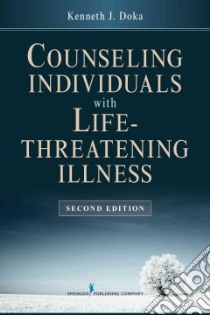Counseling Individuals With Life-Threatening Illness - 9780826195814
Un libro in lingua di Doka Kenneth J. Ph.D. Neimeyer Robert A. Ph.d. (FRW) edito da Springer Pub Co, 2013
- € 60.80
- Il prezzo è variabile in funzione del cambio della valuta d’origine
"With characteristic clarity, Doka draws on the classic and contemporary literature as well as his own pedagogy and practice in death and dying to offer orienting concepts for the whole spectrum of care people may require when illness intrudes into their lives. For each phase of the illness trajectory...he offers intelligent attention to the problems and prospects people confront, and in countless examples of actual clinical situations he brings to life the concepts that inform compassionate care."
From the Foreword by Robert A. Neimeyer, PhD
University of Memphis
The experience of life-threatening illness is one of the most difficult situations that individuals and their families ever face. This is a holistic, family-centered guide to counseling such individuals in crisis. It considers not only the physical manifestations of a life-threatening illness, but its psychological, social, economic, and spiritual implications.
This second edition has been revised and updated to reflect the most current research and enhanced theoretical development. It encompasses new therapies that enhance meaning-making at life's end, and offers expanded sections on counseling families during the illness and as they grieve. One of the book's most significant changes involves the adaptation of a model of concurrent care. This model of care has great implications for end-of-life care, bridging the divide between treatment that is primarily palliative and treatment that seeks to cure or extend life.
Comprehensive and practical, the book presents useful strategies for counselors and health care professionals to use with gravely ill individuals in every stage of the life cycle. It discusses such social and psychological factors as gender, race, ethnicity, social class, education, and intelligence, and how they inform the experience of gravely ill people. The initial crisis of diagnosis is addressed along with unique considerations for those who live with chronic illness, those who are terminally ill, and those who recover.
New to This Edition:- Generational differences as a source of diversity
- Expanded sections involving meaning-making strategies (dignity-enhancement therapy, living eulogies, reminiscence therapy, life review, meaning-centered therapy, moral/ethical issues, and heart wills)
- Discussion of end-of-life phenomena and ways to assist patient and family in interpreting and responding to them
- Enhanced coverage of caregiver issues
- Expanded discussion of spirituality
- Additional behavioral strategies to assist pain management
- Anticipatory mourning
- Post-death grief for family members
- Chronic care and rehabilitation
- Incorporates Rand Study on Concurrent Care and other new models
Informazioni bibliografiche
- Titolo del Libro in lingua: Counseling Individuals With Life-Threatening Illness
- Lingua: English
- Autori : Doka Kenneth J. Ph.D. Neimeyer Robert A. Ph.d. (FRW)
- Editore: Springer Pub Co
- Collana: Springer Pub Co (Paperback)
- Data di Pubblicazione: 08 Agosto '13
- Genere: SOCIAL SCIENCE
- Pagine: 302
- Dimensioni mm: 228 x 152 x 0
- EAN-13: 9780826195814


